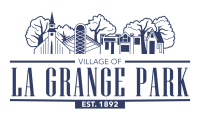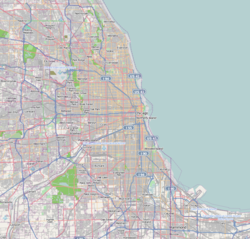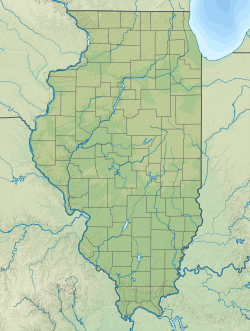Village in Illinois, United States
| La Grange Park, Illinois | |
|---|---|
| Village | |
 La Grange Park and neighboring Brookfield La Grange Park and neighboring Brookfield | |
 logo logo | |
| Nickname: The LGP | |
| Motto: "Village of Roses" | |
 Location of La Grange Park in Cook County, Illinois. Location of La Grange Park in Cook County, Illinois. | |
   | |
| Coordinates: 41°49′47″N 87°52′9″W / 41.82972°N 87.86917°W / 41.82972; -87.86917 | |
| Country | |
| State | |
| County | Cook |
| Area | |
| • Total | 2.23 sq mi (5.78 km) |
| • Land | 2.23 sq mi (5.78 km) |
| • Water | 0.00 sq mi (0.00 km) |
| Population | |
| • Total | 13,475 |
| • Density | 6,034.48/sq mi (2,330.45/km) |
| Time zone | UTC−6 (CST) |
| • Summer (DST) | UTC−5 (CDT) |
| ZIP Code | 60526 |
| Area code | 708 |
| FIPS code | 17-40793 |
| Website | www |
La Grange Park is a village in Cook County, Illinois, United States, about 13 miles (21 km) west-southwest of Chicago. According to the 2020 census, the population was 13,475.
Geography
La Grange Park is located at 41°49′47″N 87°52′9″W / 41.82972°N 87.86917°W / 41.82972; -87.86917 (41.829831, -87.869233).
According to the 2021 census gazetteer files, La Grange Park has a total area of 2.23 square miles (5.78 km), all land.
Demographics
| Census | Pop. | Note | %± |
|---|---|---|---|
| 1900 | 730 | — | |
| 1910 | 1,131 | 54.9% | |
| 1920 | 1,684 | 48.9% | |
| 1930 | 2,939 | 74.5% | |
| 1940 | 3,406 | 15.9% | |
| 1950 | 6,176 | 81.3% | |
| 1960 | 13,793 | 123.3% | |
| 1970 | 15,459 | 12.1% | |
| 1980 | 13,359 | −13.6% | |
| 1990 | 12,861 | −3.7% | |
| 2000 | 13,295 | 3.4% | |
| 2010 | 13,579 | 2.1% | |
| 2020 | 13,475 | −0.8% | |
| U.S. Decennial Census 2010 2020 | |||
As of the 2020 census there were 13,475 people, 4,917 households, and 3,576 families residing in the village. The population density was 6,034.48 inhabitants per square mile (2,329.93/km). There were 5,398 housing units at an average density of 2,417.38 per square mile (933.36/km). The racial makeup of the village was 80.82% White, 4.33% African American, 0.54% Native American, 2.37% Asian, 0.01% Pacific Islander, 3.50% from other races, and 8.42% from two or more races. Hispanic or Latino residents of any race were 11.80% of the population.
There were 4,917 households, out of which 35.4% had children under the age of 18 living with them, 60.48% were married couples living together, 10.33% had a female householder with no husband present, and 27.27% were non-families. 25.24% of all households were made up of individuals, and 15.29% had someone living alone who was 65 years of age or older. The average household size was 3.18 and the average family size was 2.62.
The village's age distribution consisted of 27.2% under the age of 18, 5.6% from 18 to 24, 23.7% from 25 to 44, 25.3% from 45 to 64, and 18.4% who were 65 years of age or older. The median age was 39.9 years. For every 100 females, there were 90.7 males. For every 100 females age 18 and over, there were 85.8 males.
The median income for a household in the village was $107,945, and the median income for a family was $136,211. Males had a median income of $76,622 versus $55,700 for females. The per capita income for the village was $49,794. About 3.6% of families and 5.1% of the population were below the poverty line, including 4.8% of those under age 18 and 8.0% of those age 65 or over.
| Race / Ethnicity (NH = Non-Hispanic) | Pop 2000 | Pop 2010 | Pop 2020 | % 2000 | % 2010 | % 2020 |
|---|---|---|---|---|---|---|
| White alone (NH) | 12,061 | 11,671 | 10,558 | 90.72% | 85.95% | 78.35% |
| Black or African American alone (NH) | 399 | 525 | 566 | 3.00% | 3.87% | 4.20% |
| Native American or Alaska Native alone (NH) | 12 | 12 | 13 | 0.09% | 0.09% | 0.10% |
| Asian alone (NH) | 217 | 258 | 316 | 1.63% | 1.90% | 2.35% |
| Pacific Islander alone (NH) | 3 | 1 | 2 | 0.02% | 0.01% | 0.01% |
| Other race alone (NH) | 19 | 14 | 31 | 0.14% | 0.10% | 0.23% |
| Mixed race or Multiracial (NH) | 112 | 169 | 399 | 0.84% | 1.24% | 2.86% |
| Hispanic or Latino (any race) | 472 | 929 | 1,590 | 3.55% | 6.84% | 11.80% |
| Total | 13,295 | 13,579 | 13,475 | 100.00% | 100.00% | 100.00% |
Government
La Grange Park is in Illinois's 4th and 7th congressional districts.
The part-time Village President is James Discipio. He is a dentist by trade and practices in Berwyn, Illinois.
Education
| This section needs expansion. You can help by adding to it. (May 2020) |
Public school districts in LaGrange Park include La Grange School District 102, Brookfield La Grange Park School District 95, and Lyons Township High School District 204. The Roman Catholic Archdiocese of Chicago operates Catholic schools. St. Louise de Marillac School is in LaGrange Park. The student population from circa 2019 to 2020 declined by 28. The archdiocese asked if there were interested benefactors, but the archdiocese was unsuccessful. Therefore the archdiocese decided it will close after spring 2020.
Nazareth Academy is a Roman Catholic college-preparatory high school located in LaGrange Park, Illinois, United States, in the Roman Catholic Archdiocese of Chicago. It was founded in 1900 by the Sisters of St. Joseph.
Transportation
Pace provides bus service on routes 330 and 331 connecting La Grange Park to destinations across the region.
Notable people
- Allan B. Calhamer, mail carrier and game maker, invented the board game Diplomacy; grew up in La Grange Park
- Kathleen Doyle, Basketball player at the University of Iowa (2016–2020); Big Ten Player of the Year in 2020. Also a silver medalist with the US national team at the 2019 Pan American Games. WNBA draftee as 14th overall pick by Indiana Fever. Grew up in La Grange Park.
- Earl Eisenhower, Illinois state representative and brother of Dwight D. Eisenhower; lived in La Grange Park
- Nick Fuentes, white supremacist, white nationalist, right-wing political commentator and activist. Leader of the Groypers
- J. J. McCarthy, Minnesota Vikings quarterback. Born and raised in La Grange Park, attended and played football at Nazareth Academy.
References
- "Village of La Grange Park, Illinois". Village of La Grange Park, Illinois. Retrieved August 31, 2012.
- "2020 U.S. Gazetteer Files". United States Census Bureau. Retrieved March 15, 2022.
- "La Grange Park village, Illinois". United States Census Bureau. Retrieved April 15, 2022.
- "US Gazetteer files: 2010, 2000, and 1990". United States Census Bureau. February 12, 2011. Retrieved April 23, 2011.
- "Gazetteer Files". Census.gov. United States Census Bureau. Retrieved June 29, 2022.
- "Decennial Census of Population and Housing by Decades". US Census Bureau.
- ^ "P2 Hispanic or Latino, and Not Hispanic or Latino by Race – 2010: DEC Redistricting Data (PL 94-171) – La Grange Park village, Illinois". United States Census Bureau.
- ^ "P2 Hispanic or Latino, and Not Hispanic or Latino by Race – 2020: DEC Redistricting Data (PL 94-171) – La Grange Park village, Illinois". United States Census Bureau.
- "Explore Census Data". data.census.gov. Retrieved June 28, 2022.
- "P004: Hispanic or Latino, and Not Hispanic or Latino by Race – 2000: DEC Summary File 1 – La Grange Park village, Illinois". United States Census Bureau.
- "Local School Districts". Village of La Grange Park. Retrieved October 6, 2023.
- "Five Archdiocese of Chicago Catholic schools will close". Chicago Catholic. January 22, 2020. Retrieved May 8, 2020. - Spanish version
- "RTA System Map" (PDF). Retrieved January 31, 2024.
- "Kathleen Doyle". United States Olympic & Paralympic Committee. Archived from the original on March 3, 2020. Retrieved March 3, 2020.
- "Kathleen Doyle". USA Basketball. Archived from the original on March 3, 2020. Retrieved March 3, 2020.
- 'Illinois Blue Book 1965-1977,' Biographical Sketch of Earl Eisenhower, pg. 219
- "Nick Fuentes, The Zoomer Nazi, Living in LaGrange Park, IL". antifascistchicago.noblogs.org. Retrieved May 27, 2021.
External links
- Village of La Grange Park official website
- La Grange Area Historical Society
- City-Data.com
- Children’s Community Closet of La Grange Park
